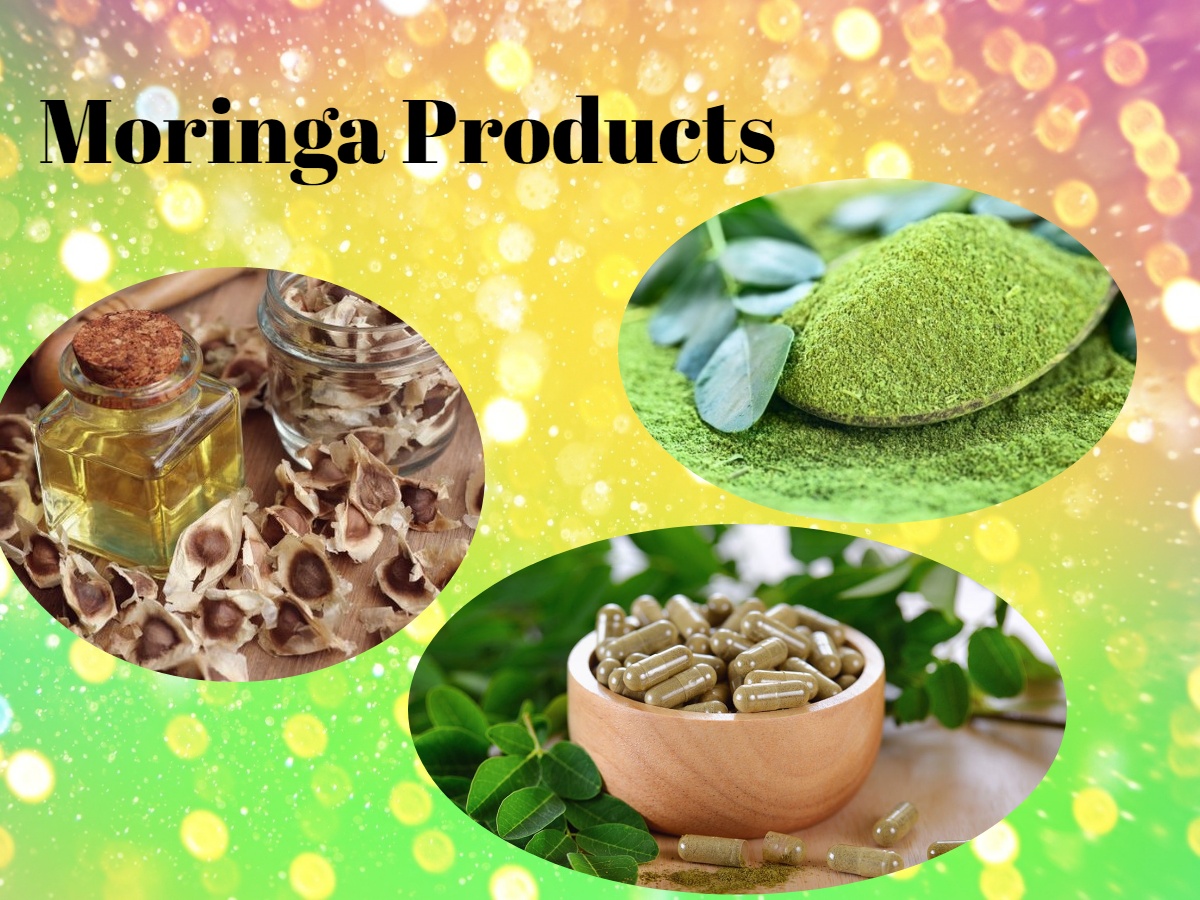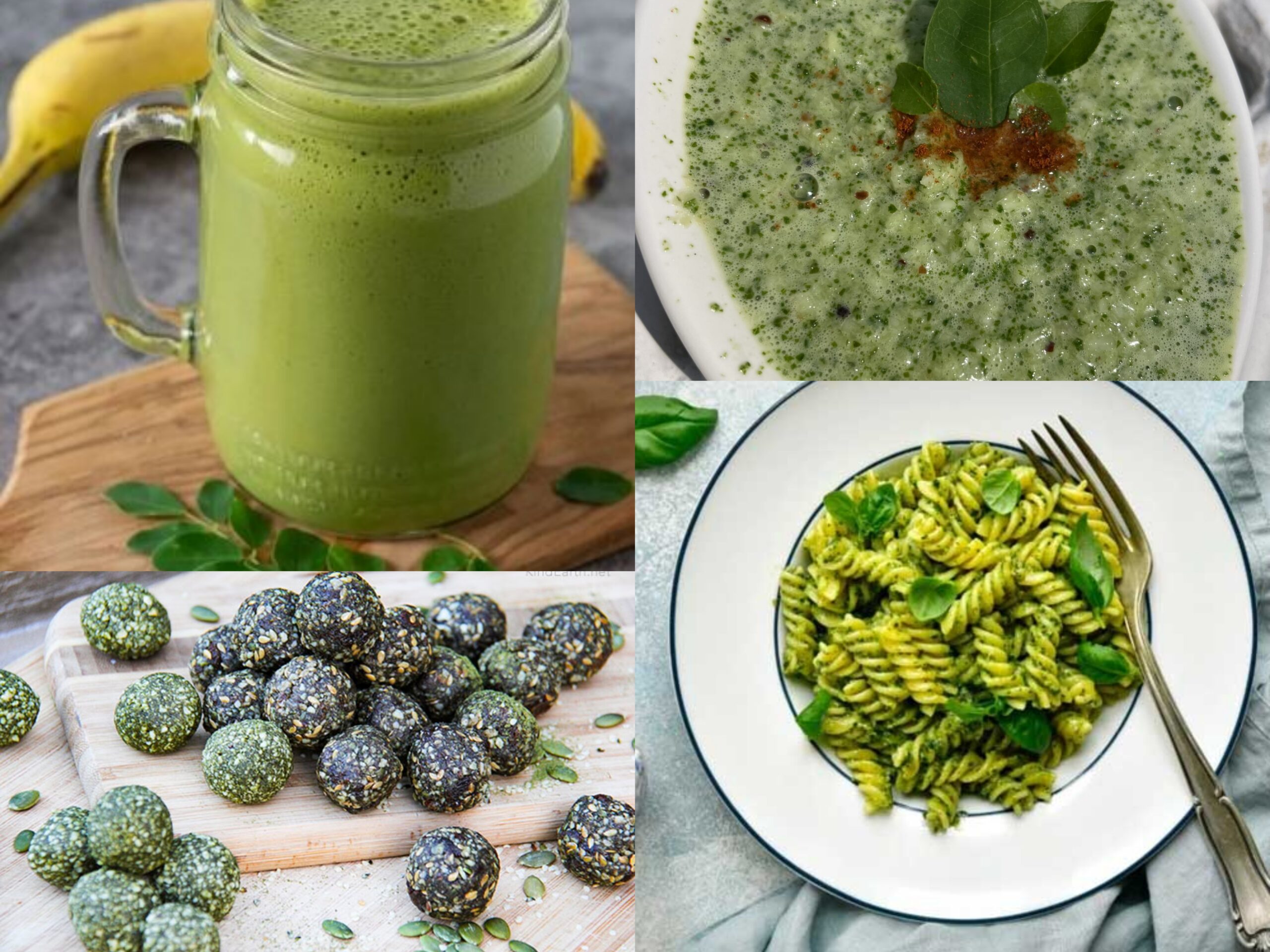Smoothies have long been celebrated as a quick and nutritious way to boost your health. But have you considered taking your smoothie game to the next level with the powerhouse ingredient known as Moringa Powder? This article dives deep into how adding Moringa Powder can supercharge your smoothies, turning them into nutrient-packed delights that your body will love.
Table of Contents
What is Moringa Powder?

Moringa powder is a nutritional supplement made from the leaves of the Moringa oleifera tree, also known as the drumstick tree or horseradish tree. It is valued for its high concentration of vitamins, minerals, and protein. Moringa leaves are dried and ground into a fine powder, which can be added to smoothies, soups, sauces, or sprinkled over food. It’s known for its earthy, slightly bitter taste and is often used as a natural supplement to support overall health and well-being due to its rich nutrient profile.
Nutritional Benefits
Moringa powder offers a range of nutritional benefits:
- Vitamins and Minerals: It is rich in vitamins A, C, and E, providing antioxidants that help protect cells from damage and support immune function.
- Protein: It contains all essential amino acids, making it a complete protein source that can aid in muscle repair and growth.
- Antioxidants: It is packed with antioxidants like quercetin and chlorogenic acid, which help neutralize free radicals and reduce oxidative stress in the body.
- Anti-inflammatory Properties: Compounds like isothiocyanates found in moringa have anti-inflammatory effects, potentially reducing inflammation and related health issues.
- Iron: Moringa powder is a good source of iron, important for oxygen transport in the blood and energy production.
- Calcium and Magnesium: These minerals are essential for bone health, muscle function, and overall well-being, both of which are present in moringa powder.
- Fiber: It contains a significant amount of fiber, which supports digestion and helps maintain healthy cholesterol levels.
- Blood Sugar Regulation: Some studies suggest that moringa may help regulate blood sugar levels, although more research is needed in this area.

How Moringa Enhances Smoothies
Moringa powder can enhance smoothies in several ways:
- Nutrient Boost: Adding moringa powder to smoothies increases their nutritional value significantly. It provides vitamins, minerals, antioxidants, and protein, enriching the smoothie with essential nutrients.
- Green Color and Flavor: Moringa powder gives smoothies a vibrant green color and a slightly earthy, spinach-like flavor. This can complement fruit flavors and add depth to the taste profile.
- Antioxidant Power: The high antioxidant content in moringa powder helps combat oxidative stress and promotes cellular health, which is beneficial for overall well-being.
- Digestive Support: Moringa powder contains fiber that supports digestive health by aiding in regular bowel movements and maintaining gut flora balance.
- Energy and Vitality: With its iron content and amino acids, moringa can contribute to increased energy levels and muscle repair, ideal for pre- or post-workout smoothies.
- Blood Sugar Regulation: Some studies suggest moringa may help regulate blood sugar levels, potentially beneficial for those managing their sugar intake.
- Weight Management: The nutrient density and fiber in moringa can promote feelings of fullness, potentially aiding in weight management when used as part of a balanced diet.
Choosing the Right Moringa Powder
Choosing the right moringa powder involves considering several factors to ensure quality and effectiveness:
- Organic Certification: Look for moringa powder that is certified organic. Organic certification ensures that the moringa leaves were grown without synthetic pesticides or fertilizers, which can impact the purity and health benefits of the powder.
- Purity and Processing: Opt for moringa powder that is minimally processed. Look for products that use a gentle drying method to preserve the nutrients and avoid excessive heat that can degrade beneficial compounds.
- Color and Freshness: High-quality moringa powder should have a vibrant green color, indicating freshness. Avoid products that are dull or brownish in color, as this may indicate oxidation or poor quality.
- Source and Origin: Check where the moringa powder is sourced from. Moringa grown in nutrient-rich soils tends to have higher nutritional content. Look for products sourced from reputable suppliers known for sustainable farming practices.
- Reviews and Reputation: Read customer reviews and check the reputation of the brand or supplier. Positive feedback and certifications from trusted organizations can provide reassurance of the product’s quality.
- Packaging: Choose moringa powder that is packaged in airtight containers or resealable bags to preserve freshness. Proper packaging helps prevent exposure to light, moisture, and air, which can degrade the powder over time.
- Price: While price can be an indicator of quality, it’s essential to balance cost with other factors like purity and source. Avoid products that are significantly cheaper than others on the market, as they may compromise on quality.
Recipes: Delicious Smoothies with Moringa Powder

1. Tropical Green Smoothie
Ingredients:
- 1 banana, frozen
- 1/2 cup pineapple chunks
- 1/2 cup mango chunks
- 1 handful of spinach
- 1 tablespoon moringa powder
- 1 cup coconut water or almond milk
- Ice cubes (optional)
Instructions:
- Add all ingredients to a blender.
- Blend until smooth and creamy.
- Adjust consistency with more liquid if needed.
- Pour into a glass and enjoy immediately.
2. Berry Moringa Smoothie
Ingredients:
- 1 cup mixed berries (strawberries, blueberries, raspberries)
- 1 tablespoon moringa powder
- 1/2 cup Greek yogurt or coconut yogurt
- 1 tablespoon honey or maple syrup (optional, for sweetness)
- 1/2 cup almond milk or any milk of your choice
Instructions:
- Combine all ingredients in a blender.
- Blend until smooth and well combined.
- Taste and adjust sweetness if desired.
- Pour into glasses and serve.
3. Green Power Smoothie
Ingredients:
- 1 cup spinach leaves
- 1/2 avocado
- 1/2 banana
- 1 tablespoon moringa powder
- Juice of 1/2 lemon
- 1 tablespoon chia seeds
- 1 cup coconut water or water
Instructions:
- Place all ingredients in a blender.
- Blend until smooth and creamy.
- Add more liquid if needed to reach desired consistency.
- Pour into glasses and garnish with a slice of lemon or mint leaves if desired.
4. Moringa Mango Lassi Smoothie
Ingredients:
- 1 cup chopped ripe mango
- 1/2 cup plain Greek yogurt or coconut yogurt
- 1 tablespoon moringa powder
- 1 tablespoon honey or agave syrup (optional)
- 1/2 cup water or coconut water
- Pinch of cardamom powder (optional)
Instructions:
- Combine mango, yogurt, moringa powder, honey or syrup, and water in a blender.
- Blend until smooth and creamy.
- Taste and adjust sweetness if necessary.
- Sprinkle with cardamom powder if using, and serve chilled.
Integrating Moringa Powder into Your Daily Routine
1. Smoothies and Shakes:
- Breakfast Boost: Add 1-2 teaspoons of moringa powder to your morning smoothie or protein shake. Combine it with fruits like bananas, berries, or mangoes, along with spinach or kale for an extra nutritional punch.
2. Beverages:
- Green Tea: Mix a teaspoon of moringa powder into a cup of hot green tea for added antioxidants and nutrients.
- Golden Milk: Stir moringa powder into warm almond milk or coconut milk with turmeric and honey for a soothing, nutrient-rich beverage.
3. Soups and Sauces:
- Nutrient Enrichment: Sprinkle moringa powder into soups, stews, or sauces just before serving to boost their nutritional content without altering the flavor significantly.
4. Baking and Cooking:
- Healthy Recipes: Incorporate moringa powder into homemade energy bars, granola, or baked goods like muffins or pancakes for an added nutritional kick.
5. Salads and Dressings:
- Superfood Salad: Mix moringa powder into salad dressings or sprinkle it directly onto salads to increase their nutrient density.
6. Yogurt and Snacks:
- Yogurt Topping: Stir moringa powder into Greek yogurt or sprinkle it over fruit salads and yogurt bowls for a nutritious snack option.
7. Daily Routine:
- Consistency: Make moringa powder a part of your daily routine by setting a reminder or keeping it visible in your kitchen to encourage regular usage.
8. Experiment and Enjoy:
- Variety: Explore different ways to incorporate moringa powder into your meals and snacks to discover what works best for your taste preferences and lifestyle.
Health Benefits of Regular Moringa Consumption
Nutrient Density: Moringa is packed with vitamins A, C, and E, providing powerful antioxidants that protect cells from damage caused by free radicals. These antioxidants help reduce oxidative stress and inflammation in the body.
Mineral Richness: It contains essential minerals like calcium, iron, and magnesium, which support bone health, oxygen transport in the blood, and overall muscle function.
Complete Protein Source: Moringa leaves are a source of all essential amino acids, making it a valuable plant-based protein option for vegetarians and vegans. Protein is crucial for muscle repair, growth, and overall body maintenance.
Antioxidant Properties: Compounds such as quercetin, chlorogenic acid, and beta-carotene present in moringa contribute to its antioxidant activity, supporting cardiovascular health and reducing the risk of chronic diseases.
Anti-inflammatory Effects: Moringa contains isothiocyanates and other compounds that have been shown to have anti-inflammatory properties, helping to reduce inflammation and associated symptoms.
Blood Sugar Regulation: Studies suggest that moringa may help regulate blood sugar levels by lowering fasting blood glucose levels and improving insulin sensitivity. This can be beneficial for individuals with diabetes or those at risk of developing it.
Cholesterol Management: Regular consumption of moringa may help lower cholesterol levels, particularly LDL (bad) cholesterol, which can reduce the risk of heart disease and improve overall cardiovascular health.
Digestive Health: The fiber content in moringa supports digestive health by promoting regular bowel movements and maintaining gut flora balance, aiding in digestion and preventing constipation.
Energy Boost: Moringa’s nutrient density, including iron and B vitamins, helps increase energy levels and combat fatigue, promoting overall vitality and well-being.
Weight Management: The combination of fiber, protein, and nutrient density in moringa can contribute to feelings of fullness and satiety, potentially aiding in weight management when part of a balanced diet.
Side Effects and Precautions
Side Effects
- Digestive Issues: Consuming moringa in large amounts may cause digestive issues such as stomach upset, diarrhea, or nausea. It’s advisable to start with small amounts to assess tolerance.
- Allergic Reactions: Some individuals may be allergic to moringa. Symptoms of an allergic reaction can include rash, itching, swelling, dizziness, or difficulty breathing. Discontinue use if any allergic symptoms occur.
- Interactions with Medications: Moringa may interact with certain medications, including those for diabetes, high blood pressure, or thyroid disorders. If you are taking medications, consult with a healthcare provider before adding moringa to your diet.
Precautions
- Pregnancy and Breastfeeding: There is limited research on the safety of moringa during pregnancy and breastfeeding. It’s best to avoid moringa supplements during these periods unless advised by a healthcare professional.
- Children: Moringa supplements are not typically recommended for children, as their nutritional needs differ and safety data is limited. Consult with a pediatrician before giving moringa to a child.
- Quality and Source: Ensure you purchase moringa powder from a reputable source to minimize the risk of contamination and to ensure potency and purity.
- Moderation: As with any supplement, moderation is key. Avoid excessive consumption of moringa and follow recommended dosage guidelines.
- Medical Conditions: Individuals with certain medical conditions, such as kidney disorders or liver disease, should exercise caution and consult with a healthcare provider before using moringa supplements.
Buying and Storing Moringa Powder
Buying Moringa Powder
- Choose Organic: Opt for organic moringa powder to ensure it has been grown without synthetic pesticides or fertilizers, preserving its purity and nutritional value.
- Check Packaging: Select moringa powder packaged in airtight containers or resealable bags to protect it from light, moisture, and air exposure, which can degrade its quality over time.
- Color and Freshness: Look for vibrant green moringa powder. Dull or brownish powder may indicate age or improper storage, potentially affecting its nutrient content.
- Read Reviews: Check customer reviews and feedback to gauge the quality and effectiveness of the brand or supplier.
- Source: Prefer moringa powder sourced from reputable suppliers known for sustainable farming practices to ensure higher nutritional content and purity.
Storing Moringa Powder
- Airtight Container: Transfer moringa powder into an airtight container if it’s not already packaged in one. This helps preserve freshness and protects against moisture and light exposure.
- Cool, Dry Place: Store moringa powder in a cool, dry place away from direct sunlight, such as a pantry or kitchen cabinet. Avoid storing it near heat sources or in humid areas.
- Avoid Freezing: Moringa powder does not require refrigeration or freezing. Store it at room temperature for optimal shelf life and potency.
- Use Within Expiry Date: Check the expiry or best-by date on the packaging and use the moringa powder before this date for maximum freshness and nutritional benefits.
- Keep Clean: Ensure the storage container and spoon used to scoop moringa powder are clean and dry to prevent contamination and maintain quality.
Environmental and Ethical Considerations
Environmental Considerations
- Sustainable Farming Practices: Look for moringa products sourced from farms that practice sustainable agriculture. This includes methods that minimize environmental impact, such as organic farming techniques and water conservation practices.
- Biodiversity Conservation: Choose suppliers who prioritize biodiversity conservation. Moringa trees can support local ecosystems and biodiversity, particularly in regions where they are native.
- Carbon Footprint: Consider the carbon footprint associated with sourcing and transporting moringa products. Supporting local or regional suppliers can reduce carbon emissions compared to products imported over long distances.
- Packaging: Opt for moringa powder packaged in environmentally friendly materials, such as recyclable or biodegradable packaging. Minimize single-use plastics whenever possible.
Ethical Considerations
- Fair Trade Practices: Support brands that adhere to fair trade principles, ensuring fair wages and working conditions for farmers and workers involved in moringa production.
- Community Impact: Choose suppliers that contribute positively to local communities where moringa is cultivated. This can include supporting education, healthcare, and infrastructure development initiatives.
- Transparency: Look for transparency in the supply chain. Suppliers should disclose information about sourcing practices, quality standards, and certifications related to environmental and ethical practices.
- Certifications: Consider moringa products certified by reputable organizations that verify sustainable and ethical practices, such as Fair Trade, USDA Organic, or Rainforest Alliance.
Customer Reviews and Testimonials
Importance of Customer Reviews
- Authentic Feedback: Reviews provide firsthand accounts from customers who have used the moringa powder, offering insights into its taste, effectiveness, and overall satisfaction.
- Product Quality: Positive reviews often highlight the quality of the moringa powder, including factors like freshness, potency, and whether it meets expectations in terms of nutritional benefits.
- Customer Experience: Reviews can also reveal the supplier’s reliability, customer service responsiveness, and shipping efficiency, which are important considerations for online purchases.
- Comparative Insights: Reading multiple reviews allows potential buyers to compare different brands or suppliers of moringa powder, helping them make informed choices based on others’ experiences.
Testimonials
- Personal Stories: Testimonials often include personal stories of how moringa powder has benefited individuals, such as improved energy levels, better digestion, or enhanced overall health.
- Health Benefits: They may highlight specific health benefits experienced, such as reduced inflammation, improved skin condition, or better management of chronic conditions.
- Trust and Credibility: Testimonials can build trust and credibility for a brand or product, especially when they come from recognized individuals or professionals in health and wellness fields.
- Inspiration for Use: Testimonials can inspire new ways to incorporate moringa powder into daily routines or recipes based on successful experiences shared by others.
Source to Get Organic Moringa Leaf Powder Capsules
| Moringa Leaf Powder Capsules |
| Organic Moringa Leaf Powder Capsules |
| Best Moringa Leaf Powder Capsules |
| High-quality Moringa Powder Capsules |
| Affordable Moringa Powder Capsules |
Conclusion
Incorporating Moringa Powder into your daily routine is a simple yet effective way to elevate your nutritional intake. Whether you blend it into a morning smoothie or sprinkle it over your salad, Moringa Powder offers a convenient solution to boost overall health and wellness.









